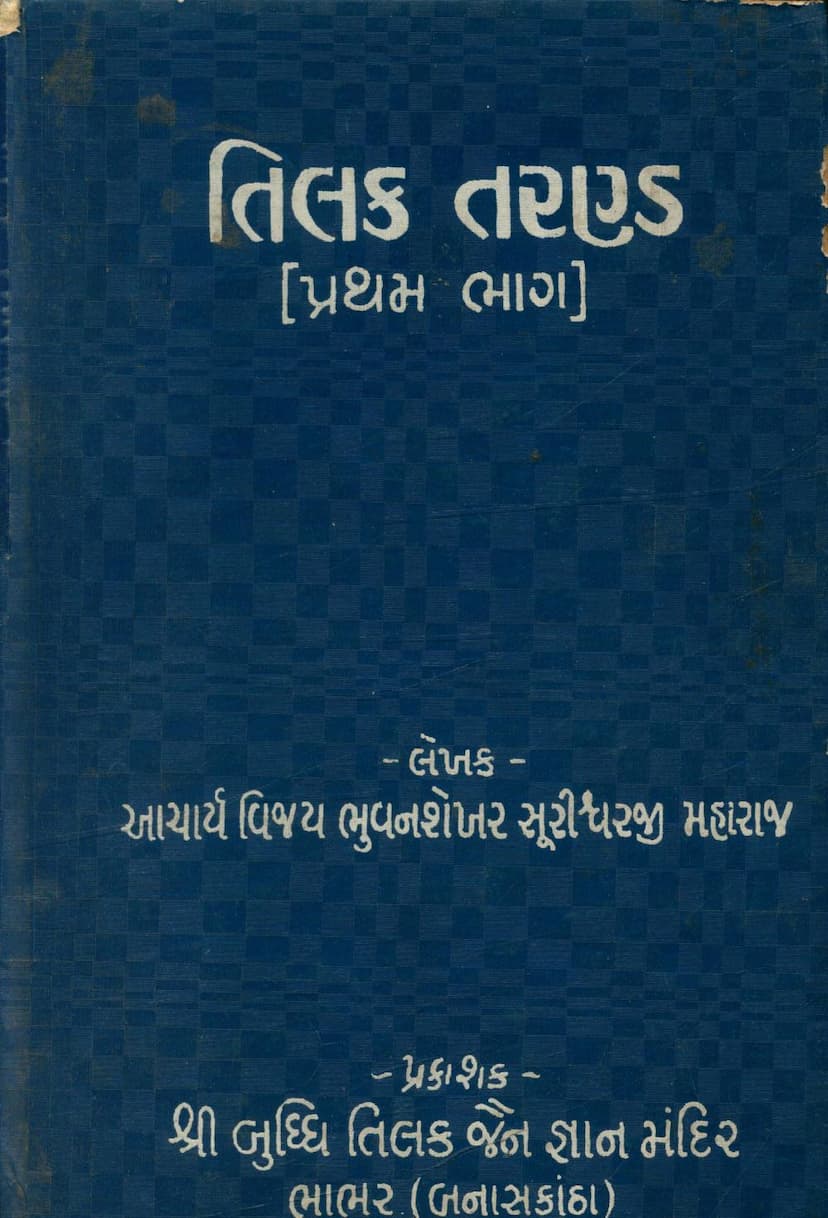Tilak Tarand Part 01
Added to library: September 2, 2025

Summary
This is a comprehensive summary of "Tilak Tarand Part 01" by Acharya Vijaybhuvanshekharsuri, published by Vadilal and Devsibhai Company. The book is a collection of various teachings, anecdotes, and spiritual insights, presented in a format that can be broadly categorized into three sections:
1. Subhashitas (Aphorisms/Wise Sayings) and Suvicharas (Good Thoughts):
- This section comprises short, impactful verses and statements that convey profound life lessons. These are described as potent, like concentrated atomic energy in a small particle, capable of transforming a life.
- Examples of themes covered include:
- The difference between knowing the path and understanding its essence.
- The nature of sight, distinguishing between mercy and doubt.
- The limitations of material measurement when it comes to spiritual truths.
- The importance of purity of thought.
- The constant remembrance of the soul.
- The impermanence of youth.
- The distinction between intellect and wisdom.
- The necessity of both knowledge and action in the wheel of life.
- The superiority of the human birth.
- The dangers of a life of luxury.
- The paradox of worldly happiness.
- The principle that actions determine evaluation.
- The multifaceted nature of women: their captivating charm and their role in spiritual progress.
- The author uses vivid imagery and analogies to make these concise points memorable and effective.
2. Information-Based Writings:
- This section presents factual information derived from various Jain scriptures and philosophical texts.
- Topics covered include:
- The five afflictions (kleshas) in Patanjali's Yoga Sutras.
- The four factors that led Tirthankara Bhagavan to Keval Gyan (omniscience) after initiation.
- The three divisions of the animal kingdom.
- Four types of detachment (vairagya).
- Five causes recognized in scriptures.
- Twenty-one virtues of a true householder (shravaka) as described in the Ratna Prakaran.
- Three types of suffering.
- The appropriate foundation for meditation.
- The meaning of the Parithavaniya Vrata.
- Twenty-one types of water as specified in the Acharanga Sutra.
- Navaniryaanas (Ninefold determinations or vows).
- Religious acts performed by Vastupal and Tejpal.
- Two types of fearlessness (abhayadan).
- Theological interpretations of each letter of the Navkar Mantra by Acharya Siddhasen Divakar Surishwarji.
- Prophecies made by Bhadrabahu Swami.
- Human characteristics based on specific signs as described in Anga and Upanga.
- Classifications of the 18,000 Shilanga Granthas.
- Five types of purity to be maintained by those who accept the path of conduct.
- This section serves as a repository of knowledge, drawing from diverse scriptural sources.
3. Anecdotal and Illustrative Stories:
- This part features stories and episodes from the lives of notable personalities and philosophical parables that illustrate moral and spiritual principles.
- The collection includes anecdotes about:
- Bernard Shaw.
- Mahatma Gandhi's personal experiences.
- The burden of debt.
- Ramana Maharshi's vow of non-begging.
- The generosity of Maagh Kavi.
- The boon granted to Kumbhakarna.
- Parables like the dog in the glass palace, the lion at the well's edge, Socrates' advice to his disciple on sexual union, Dhritarashtra's blindness, the necessity of idols as an exemplary illustration, Kabir's story with the bitter gourd, Bhartrihari's alms-giving, Chandana's experience in a brothel, and different interpretations of a king's ill dream.
- The story of Alexander the Great and the artist, and Ambada Parivrajaka.
- These stories are presented to make the teachings more relatable and engaging.
Overall Themes and Tone:
- Broad Appeal: The book avoids sectarianism or overly religious language, drawing wisdom from diverse sources including Jain saints, figures like Sant Tukaram and Meerabai, and Western thinkers like Bernard Shaw and Mahatma Gandhi.
- Emphasis on Action and Inner Growth: The text critiques a mere ritualistic adherence to practices, emphasizing the importance of genuine inner transformation, as exemplified by the question posed to those who have been observing Samayika for fifty years: "Has the Samayika changed? Have you progressed or regressed?"
- Core Values: "Tilak Tarand" champions values such as peace, equanimity, good conduct, purity of discipline, discipline, civility, and ethical integrity as fundamental for shaping human life.
- Metaphorical Title: The title "Tilak Tarand" itself is a metaphor. "Tarand" means a ship or boat, and the book aims to be a "Tilak" (a mark of distinction or guidance) for its readers, helping them navigate the vast ocean of existence filled with adversities.
- Inspiration: The book is intended to stimulate curiosity and provide a rich compilation of valuable material for the general reader.
In essence, "Tilak Tarand Part 01" is a devotional and educational work that aims to enlighten readers with timeless wisdom, practical advice, and inspiring stories from various traditions, all geared towards fostering a life of spiritual growth and ethical conduct.